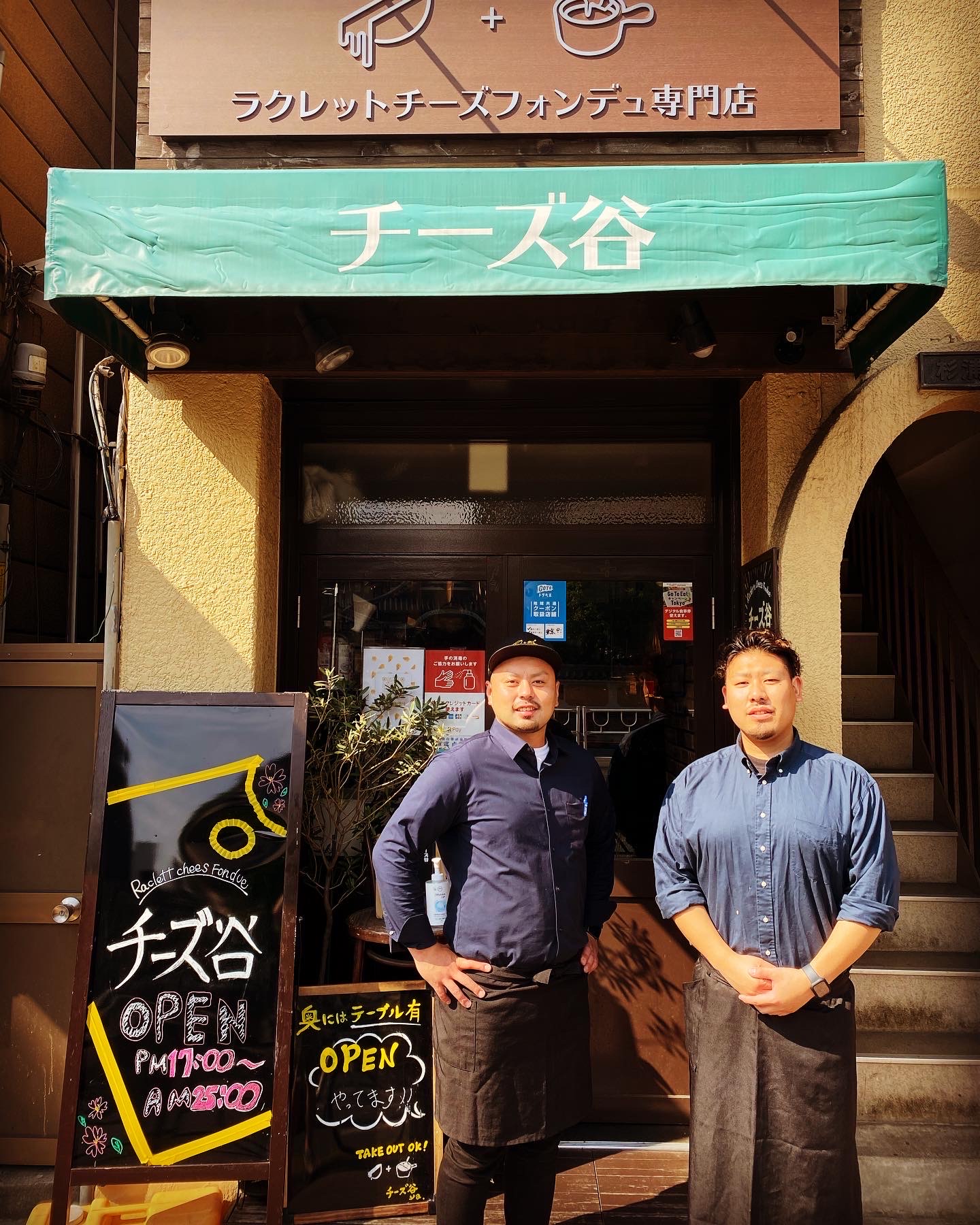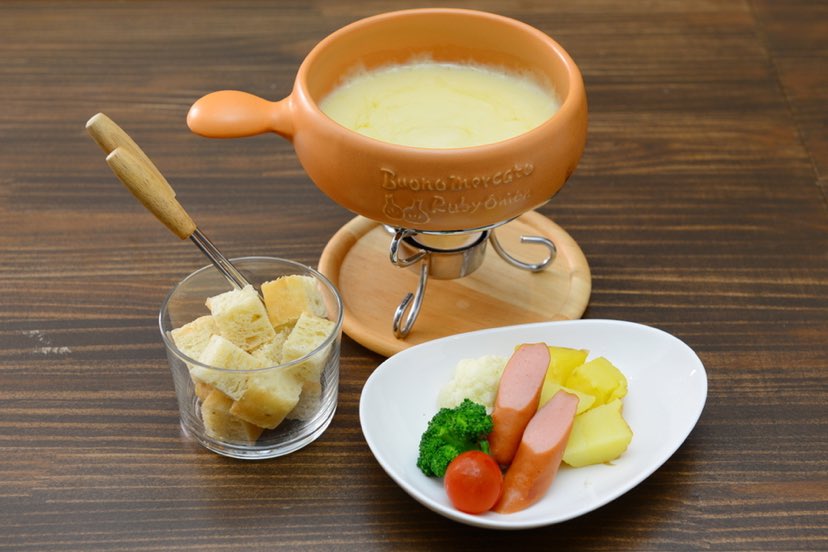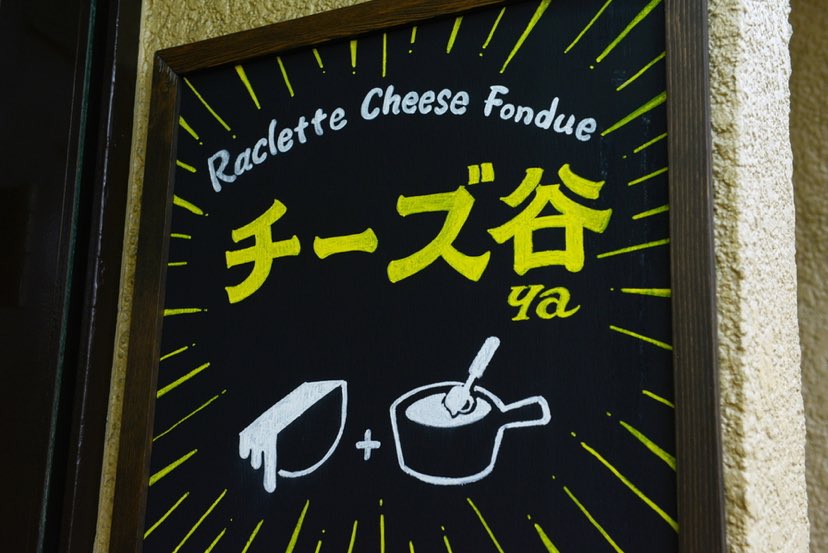Japanese Food History and Culture
Fondue and Raclette: Interview with Japan’s Cheese Chefs
This is the second part of a two-part series about cheese in Japan. In this interview, we discuss working and managing restaurants offering cheese specialties like raclette and fondue with two Japanese chefs. In the first part, we cover the history and current-day state of dairy in Japan.
With the rising popularity of foreign foods in Japan, places such as Italian pizzeria, kebab stalls and French restaurants have become a common sight in major Japanese cities. To learn more about those restaurants offering novel fares, we met with two Tōkyō chefs specializing in cheese-based cooking. At their restaurants, they serve Swiss specialties such as raclette and cheese fondue, as well as other cheese dishes and foreign wines. They share with us their experience with bringing a novel cuisine to Japan.
About CHIZUYA
Gochisō History: Thank you for your time! Could you first tell us a bit about yourself?
Takei “Hiro” Hiroki: My name is Takei Hiroki, 37 years old, born and raised in Tōkyō. I’ve founded my own company, CLUST, and currently own two restaurants: Chīzuya (チーズ谷) in the Iriya neighborhood (Taitō ward), and One’s Raclette in the Yushima district (Bunkyo ward).
Takeshita Yūtaka: My name is Takeshita Yūtaka, from Tōkyō as well. I work for CLUST as the Chīzuya chef and manager.
GH: What is the concept behind Chīzuya?
Hiro: As the name suggests, we offer a cuisine centered around cheese. We cook various yōshoku (ie. Western-style) foods and strive to entertain our customers by preparing the dishes in front of them. For instance, by scraping raclette cheese directly on a plate on the table or by mixing and serving the cheese risotto in a hollowed cheese wheel. We want our customers to enjoy not only the taste, but also the visual experience of eating at Chīzuya.
GH: And how did you come up with the name Chīzuya?
Hiro: Because I want to sell cheese! *laughs* Well, since we’re in Iriya (note: written 入谷, meaning “entrance of the valley”) and we cook cheese, it made sense. I did try to come up with something cool, like “Cheese Valley” or “Fromagerie Something Something…”, but it didn’t really fit me. Moreover, it’s important the name makes immediately clear what the restaurant is about.

GH: Indeed, the name speaks for itself! What led you to work with cheese?
Hiro: Some 15 years ago, I was working for a restaurant company as a chef. The company closed, and with another coworker we decided to open a yōshoku restaurant. However, we felt that was too generic, too bland. We needed a concept, to have our own specialty. Just as we were having those conversations, a documentary came up on NHK. It was about a Japanese raclette cheese crafted by Kyōdōgakusha Shintoku Farm in Hokkaidō. The seared cheese being scraped had a great visual impact, and it looked delicious! At that time, raclette was virtually unknown in Japan, and we thought: “That’s it! That’s what we should do!” So really, it wasn’t cheese per se, but specifically raclette we were going for. Then we looked up other specialties from the birthplace of raclette, Switzerland. We found the cheese fondue, and decided to do that as well. Soon enough, we were adding all sorts of cheese dishes to the menu.
When we were getting started, we had to explain every time what raclette is. No one knew about it. The biggest help in spreading knowledge about Swiss cuisine has been the resurging popularity of the anime Heidi, Girl of the Alps. Thanks to Heidi, Japanese people have at least an idea of what raclette is!
GH: It is true every time I mention I come from Switzerland, I get “Ah, like Heidi!”…
Hiro: Right? So we went and opened One’s Raclette. My coworker owned the restaurant, and I worked there as a chef for around 10 years. I then decided to open my own cheese restaurant and become independent, and that is how Chīzuya came to be. Later, I bought back One’s Raclette and I’m managing both locations now.
Yūtaka: For my part, I didn’t have any experience with cheese before starting at Chīzuya. I was working for a Japanese restaurant in Toronto (Canada), but due to the COVID restrictions, all the places were closing down, so I had to come back to Japan. I was then looking for a job in Tōkyō, and a mutual acquaintance introduced me to Takei-san. I have been working at Chīzuya for a bit more than 2 years now, and I am learning on the job how to work with cheese as well as how to manage a shop.
GH: Regarding training and learning, have you passed the examination for becoming a licensed “cheese expert”?
Hiro: Aha, that certificate! Indeed, I have a “Comrade of Cheese” certificate from the Cheese Professional Association. There are some more levels above that, but they are quite difficult to pass, because a lot of the required knowledge can be found only in French. So that’s why I opted to focus on learning by doing! The knowledge can be useful, but if you are not planning on producing and trading cheeses, the certificate isn’t really necessary.
Yūtaka: I haven’t tried yet, but listening to this conversation, I’ve started to think maybe I should! *laughs*
GH: Next, can you please tell us a bit about the day-to-day at Chīzuya?
Yūtaka: Chīzuya is open from 5pm to 1am, Tuesday through Saturday, and 5pm to 11pm on Sunday. So on a typical day I arrive at the shop around 2pm. I start by cleaning inside and in front of the restaurant. I then get started on the prep work for the day, so that it is all in order and ready by opening time.
Hiro: In the early evening, customers typically come to dine. We’re in a residential neighborhood, so we often have people coming on their way home from work, or local families going out. Later in the evening, people coming in have already eaten elsewhere and the restaurant becomes more of a bar, with customers chatting and drinking wine while munching on snacks.
“(…) eating some cheese cuisine makes for a change of pace compared to the usual izakaya and yakiniku.”
GH: Closing time is quite late. Do you often get customers ordering some raclette or fondue at midnight? Seems a bit heavy on the stomach…
Hiro: Actually, sometimes! People like us who work in the food service industry also come here after their shift for late dinner. To them, eating some cheese cuisine makes for a change of pace compared to the usual izakaya and yakiniku.
GH: So Chīzuya has mostly local, regular customers. How about One’s Raclette?
Hiro: It’s a bit different for One’s Raclette. There are more people who use online review sites like Tabelog or Gurunavi to find a place for dinner. And it’s more popular with women. I remember one day, we were at full capacity and I noticed there was only one man for close to 30 women! Really, around 90% of our customers were women. Nowadays, we’re closer to 70%, as this kind of cuisine is slowly becoming popular with men as well.
GH: What would you say are the most popular items on your menu?
Hiro: As expected, raclette is our most popular dish. The cheese fondue is also a classic, but its popularity varies depending on the season. In the winter it is in high demand, but during the warm months of the year it is less requested. In the summer, customers are looking for more “refreshing” dishes. So that’s one of our current challenges: what kind of cheese dish can we offer for the summer? For instance, a kind of cold, lighter fondue?
GH: Interesting. So that is your thought process when writing the menu?
Hiro: In a nutshell, yes. We decide what we are going to write on the menu by having those conversations. For instance, one would say “In the summer, I feel like I would like to eat something like that.” The other one would add: “Sure. We could prepare it this way.” “Right, let’s try it!” And then, through trial and error, we fine tune the dish.
Also, we try to always have cheese somewhere in the dish. I feel like at least 80% of the menu should be based on cheese, while at the same time having some lighter, dairy-free items as well.
The heaviness of the food is a challenge. We’re always trying to think of ways to make the dishes less heavy. If you eat some raclette today, would you have some more tomorrow? Especially for Japanese people, used to washoku (ie. Japanese-style) cooking, yōshoku food is too heavy for them to eat everyday. So I would like to cook meals that Japanese people want to eat at least once a month, or even once every two weeks. That is why we keep looking for ways to adapt cheese dishes and create lighter versions.

GH: So the heaviness of the dish is an important factor when deciding the menu?
Hiro: Absolutely. When we write the menu, we keep a broad view of how the items are ordered. We remove items that are too identical to each other, and try to balance the whole fare. And the flow is also important. A customer would rarely start by eating a big piece of red meat before ordering a salad. So even without a course menu, we try to think of the logical order when putting all the pieces in place.
GH: As you use a lot of imported cheeses, is the availability (or lack thereof) of certain ingredients a big factor for you?
Hiro: Since we’re a small-scale business, we do not import products ourselves. Rather, we rely on specialized importers who take care of bringing cheeses, wines and other goods to Japan. So on one hand, it’s easier for us as we do not have to think about the whole import process or keep a network of contacts outside the country. On the other hand, this also means we are constrained by the catalog those importers offer. So indeed, we can’t always get the cheeses we would like.
The thing is that a lot of information about cheese isn’t available in Japanese. So although it is becoming more and more popular in Japan, most Japanese people do not know anything about it. I remember I was staying at a hotel where they were offering various cheeses at the buffet. They had an excellent blue cheese that I liked, but the tag simply said “blue cheese”. So I asked one of the staff which cheese this was, and he went into the kitchen to confirm. Shortly after, he came back to helpfully inform me “Sir, this is blue cheese.” Couldn’t say anything else than “Thanks. That is correct.” *laughs*
So because of the lack of information, there’s no demand. And if there’s no demand, there’s no incentive to translate and spread this information, so it’s a vicious cycle kind of situation. That is why I also want to teach something to our customers, that when they leave Chīzuya, they have learned something.
GH: Regarding working at Chīzuya, which part of the job do you enjoy the most?
Yūtaka: In my case, I’d say communication is a big one. The restaurant is pretty small and it is an open kitchen, so we’re always near the customers. Moreover, a lot of them are regulars from the neighborhood. Being able to communicate, knowing when and how to step in a conversation, how to talk to different people, those kinds of skills are very important. Because I like socializing, that’s a part of the job that I really enjoy. Meeting with new people, getting to know them, seeing them again another day… If I were working in a larger, busier restaurant I wouldn’t have those opportunities.
Hiro: I really like the fast pace of the restaurant world. You have to stay on your toes and be quick, and the feedback is practically instantaneous. You know immediately if what you’ve cooked is delicious or lackluster. And you meet a lot of people! Compared to a lot of other jobs where you stay with the same people all year long, I meet people I have never seen literally every day.

GH: Your relation with the customers seems very important!
Hiro: Exactly! Even if the meal is delicious, you can’t enjoy it if the ambiance is awkward.
GH: So what’s in store for the future? Any plans, or goals you would like to achieve?
Hiro: As a company, we would like to open more locations. We currently have two restaurants, and we would like to increase their number, not only in Tōkyō, but in the whole country. Who knows, in the distant future we might even be setting up shops overseas! I would love to open a Japanese-style cheese restaurant in Switzerland, bringing the kind of Japanese-Western hybrid cuisine we have been developing here!
On a more personal level, while working on developing this business, I would also like to make sure I can spend enough quality time with my family. There’s no point in having a successful business if you can’t enjoy the fruit of your labor with your close ones!
Yūtaka: I would really like to see Chīzuya prosper and thrive. The COVID restrictions have hit the restaurant pretty hard (note: Chīzuya opened right at the onset of the COVID pandemic in Japan), and customers are only slowly coming back. So my goal right now would be to have as many full house days as possible. In summary, have everyone be extra busy! *laughs*
GH: Sounds exciting! We’re wishing you the best of luck in your endeavors, and are looking forward to the Swiss branch of Chīzuya! Any closing statement?
Hiro: If you happen to be Tōkyō, please come by to enjoy some Japanese-style cheese cuisine!